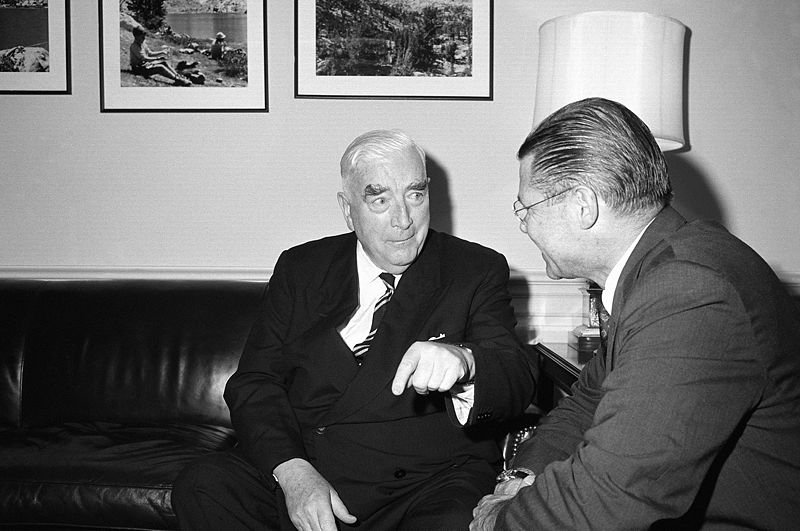Robert Menzies: The Art of Politics, Troy Bramston, Scribe
Robert Menzies looms large in Australia’s history, as our longest serving prime minister, and the only one to go at the time of his choosing. In Troy Bramston’s ably succinct biography, Menzies is an exemplary leader, intelligent, principled, with a clear vision, dignified, even elegant (Bramston is very taken with Menzies’ suits).
Menzies was not from the born-to-rule set, and his humble country upbringing helped with understanding voters, but his intelligence led to scholarships and an early career in law. His lack of war service was key, Bramston thinks, to his decision to try for a different kind of public service, in parliament. Menzies rose quickly and was quickly seen as PM material.
He could be arrogant, largely because of his intelligence – others didn’t measure up – and this hampered him when he first arrived in Canberra. Also, he spoke like a lawyer, and had to learn to simplify his arguments, as well as learn to cultivate relationships. His first prime ministership, over quickly, was an education. As with other leaders (such as Richard Nixon, who admired Menzies greatly), defeat strengthened his resolve to win next time.
But he had a conciliatory, gentlemanly approach to politics, now seldom seen (though the media can be blamed for the current state of political debate as much as the calibre of politicians). He had a high-minded idea of politics as a battle of ideas and thought politicians should go along with the opposing party when offered better ones. He had genuine friendships with political foes.
Where he sits on the political spectrum is contested. Malcolm Fraser thought Menzies was definitely not a conservative. Howard thought Menzies ‘obviously’ was. He wasn’t anti-union, and expanded government. He was a famously proud Anglophile, and even the Queen was embarrassed by his fawning. His loyalty stemmed partly from his admiration of Britain’s legal and political systems, inherited by Australia, but race also played a part. He wasn’t a white supremacist, but almost. He resisted non-white immigration, didn’t like multiculturalism, and although he labelled apartheid wrong (tellingly, he thought it impractical), he thought non-white races ultimately inferior and incompatible with (mainstream) white Australia.
He never saw Australia as part of Asia, and thought Australia was tied to the UK and the USA by race and culture. He completely misunderstood the Vietnam War and offered troops simply as a show of loyalty to the US, though there was a certain amount of pragmatism there also. Like other Australian leaders, he saw strategic reasons for staying close to the US.
He did nothing for Indigenous Australians – they barely registered on his radar. Letting the British conduct nuclear tests in the Outback was a particularly deplorable act. Not only did he not inform his cabinet, but the failure to care for Indigenous people in the area left a legacy of multigenerational illness.
His racism can’t be just excused away by saying that he was of his era. There were alternative examples, and his contact with Methodists could have showed him other ways. (His family was Presbyterian but worshipped in Jeparit in a Methodist church.) And he was tolerant of religious pluralism, a backlash against what he called his ‘bigoted’ family.
In retirement he asked Bob Santamaria what Santamaria thought Menzies’ three mistakes were. Santamaria reluctantly offered the expansion of Canberra and universities, and the creation of the Liberal Party. Menzies, likely with self-deprecation but also a hint of truthfulness, replied that they were the only three things of significance he did! Menzies himself said his greatest achievements were the creation of the Liberal Party and keeping the Liberal/Country party alliance together.
From this book, it’s hard not to come to the conclusion that his achievements were the Liberal Party and the longevity of his prime ministership, neither of which can be fairly said to have benefitted all of Australia (though Liberals may disagree – some Liberals think their ideology is simply Australia’s default ideology). Although he was a talented politician and impressive statesman, it’s harder to pin down to what ends these means were directed, beyond providing an example of good character. He didn’t steer the country through World War II and only returned to power in time to ride on post-war prosperity. Although he is said to have lain the foundations for modern Australia, twenty-first century Australia, as Bramston admits, is very different to the country Menzies led and the country he envisaged.
Nick Mattiske blogs on books at coburgreviewofbooks.wordpress.com














